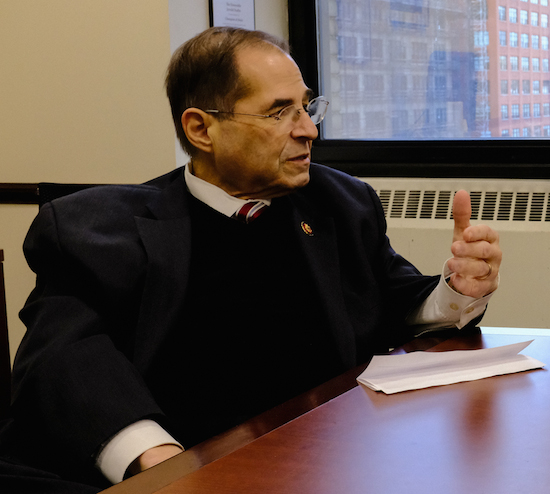Today, my congressman, Jerry Nadler, was interviewed by our Upper West Side local online paper, The West Side Rag.
He talked about a lot of things — current legislation, policing, the virus. But for me, the most significant statements he made were about the 2020 election, repairing the federal government, what will happen to Trump if he refuses to accept the results, and whether he should be prosecuted after he’s out of the White House.
I’ve pulled excerpts (with my internal captions). He makes some startling comments.
By Michael McDowell
Protecting the November election
WSR: How do Democrats in Congress plan to protect the November election?
JN: That is a very serious question. There are several things we have already done and other things we have to do.
First of all, given the pandemic, you don’t want to force people to choose between their health and their vote. In the Heroes Act that I mentioned, we mandate that every state have total mail-in balloting, as an option. People could still go and vote if they wanted to, on Election Day or early voting, but every state would have to provide for total mail-in balloting.
We also provide $4 billion dollars in that bill for the expenses of the states in instituting mail-in balloting, because it takes time, and time is starting to run out to order paper ballots—among other things. That’s the main thing we have to do.
Cybersecurity for the election
There’s another thing that we have to do, and that is cybersecurity for hacking attacks against the voter base or against the elections, by Russia or someone else. We passed legislation in the House to do that last year, but Senator McConnell and the Republicans refused to do it, maybe because they know that the Russians helped Trump last time and they want to enable them to help him again. That’s a separate danger.
What if Trump disputes the election results?
WSR: If Biden wins in November, and Trump disputes the result or refuses to leave the White House, what will you do in Congress?
JN: You can’t really tell, until you see what Trump or [the Trump Administration] does. I think the biggest danger is that they screw around with the voting totals, perhaps electronically, and try to then contest it, saying this state is very close, that state is very close. All you can really do on that, besides providing cyber protection, is have a corps of lawyers in every state, ready to go, and to keep an eye on what they’re doing.
Worst-case scenario
The worst-case scenario is that Trump simply refuses to leave the White House and tries to declare the election null and void somehow, and then it becomes a question of force. The armed forces have to obey the Constitution and not the incumbent president at that point.
Repairing federal agencies
WSR: Thinking about federal agencies that serve New Yorkers … from the Equal Employment and Opportunity Commission, to the Environmental Protection Agency, do Democrats in Congress have a comprehensive plan to address what the Trump Administration has done to federal agencies and the bureaucracy?
JN: Well, we’re going to have to approach it agency by agency. I don’t know if you can talk about a comprehensive plan, because they’ve done so much damage to so many different agencies. There are certain things that they’ve done across the board that we’ll have to deal with across the board, and we are preparing for that. Unfortunately, as long as Trump is president and you have a Republican Senate, we’re not going to get any of this through.
Come January, God willing, when we don’t have a Republican Senate and we don’t have Trump, we’re teeing up a lot of legislation and proposals to undo the damage, to restore civil liberties, and to restore due process. For example: to say that the president can’t fire inspectors general except for cause, one thing, and to get around the administration’s thumbing its nose at congressional subpoenas, so there’s a lack of accountability.
Changing the DOJ determination that a sitting president can’t be prosecuted
This Justice Department—which is really Trump—[determined] that a sitting president cannot be prosecuted, which is why Mueller, in the Mueller Report, said he couldn’t consider an indictment of the president.
I think we should re-examine that. I think that is wrong, and we should, as a matter of law, change that. The president should not be above the law. Any president.
Indicting and prosecuting Trump
Secondly, I think once Trump is out of office, then we’re going to have to indict and prosecute him for all of the crimes he’s committed, and let that set an example for future presidents.
WSR: If Biden is elected in 2020, you would move to investigate Donald Trump in 2021?
JN: Well I certainly think it ought to be done.
Look, Michael Cohen was prosecuted by the U.S. Attorney in New York, for in effect paying off Stormy Daniels, which is an illegal campaign contribution. The Mueller Report said that he was ordered to do so by Person 1, whom they didn’t identify, but which is obviously the President.
If Michael Cohen was guilty and is in jail, the President was part of the same crime. And he ought to be prosecuted for that. He wasn’t prosecuted only because the Justice Department takes the position that you can’t prosecute a president, which I think is wrong. The president has obviously committed many other crimes, and no person is above the law.
I would think he would be prosecuted…

